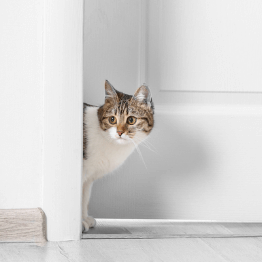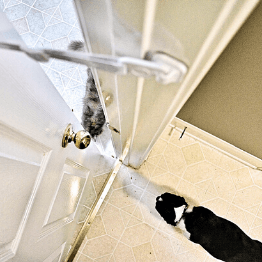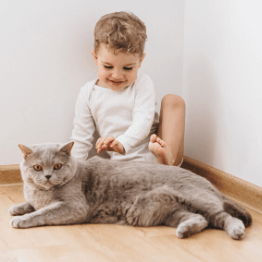Rabies Vaccine for Cats: All You Need To Know
By: Door Buddy Editors | Published: 24 July 2024

We're diving into a crucial topic for our kitty companions: the rabies vaccine for cats, which guards against a typically fatal virus. Whether you're a new cat parent or a seasoned pro, understanding this vaccine is essential for keeping your furball safe and healthy. It's one of the most important vaccines they can receive
WHAT IS RABIES?
Rabies is a serious and often fatal viral disease that affects the central nervous system of mammals, including cats and humans. It’s primarily spread through the bite or saliva of an infected animal. Once symptoms appear, rabies is almost always deadly. That’s why prevention through vaccination is key!

WHY VACCINATE YOUR CAT?
Whether your kitty is an indoor cat or outdoor cat, vaccinating against rabies is vital. Here’s why:
1. Legal Requirements: In many places, rabies vaccination is required by law for pets, including cats.
2. Safety First: Rabies can be transmitted to humans. Vaccinating your cat helps protect your family and community.
3. Unexpected Events: Indoor cats can escape or come into contact with rabid animals that might enter your home.
WHEN SHOULD YOUR CAT BE VACCINATED?
Kittens typically receive their first rabies vaccine at around 12 to 16 weeks of age. They’ll need a booster one year later, and after that, every one to three years depending on the vaccine used and local regulations. Always follow your vet’s recommendations.

TYPES OF RABIES VACCINES
There are two main types of rabies vaccines for cats:
1. Killed Virus Vaccine: This is the most common type and is considered very safe.
2. Recombinant Vaccine: This newer option may cause fewer reactions in some cats.
RABIES SHOT SIDE EFFECTS
Most cats handle the rabies vaccine like champs, but some might experience mild side effects such as:
-
Lethargy: Your cat might seem a bit sleepy or less active for a day or two.
-
Mild Fever: A slight increase in temperature can occur.
-
Soreness at the Injection Site: Some kitties might have a tender spot where the shot was given.
Serious side effects are rare, but if you notice swelling, difficulty breathing, or severe lethargy, contact your vet immediately.

RABIES CAT SYMPTOMS
Spotting signs of rabies in your feline friend can be crucial for their health and safety. Here are some telltale hints:
1. Sudden mood swings: unexpected grumpiness or extra shyness.
2. Unusual amount of drooling.
3. Trouble swallowing.
4. Wobbly or unsteady movements.
5. Seizures or paralysis.
6. Disorientation or confusion.
7. Excessive vocalization or meowing.
8. Recent encounter with a wild critter.
If you notice any of these signs, a vet visit is a must! Catching these signs early can help keep your furry buddy safe and sound.
FAQS ABOUT RABIES IN CATS

Q: What should I do if I suspect my cat has been exposed to rabies?
A: If you suspect your cat has been exposed to rabies, contact your veterinarian immediately. They will likely recommend a booster rabies vaccination if your cat's vaccination is current. If your cat is not vaccinated, strict quarantine measures may be necessary to monitor for signs of rabies. It's also important to report the incident to local animal control authorities to help prevent the spread of rabies.
Q: Can indoor cats get rabies?
A: While it's less common, indoor cats can still get rabies if they have contact with a rabid animal that enters your home, like a bat. Keeping your cat's rabies vaccination up to date is essential, even for indoor-only cats, to ensure they’re protected just in case.
Q: Is rabies treatable in cats?
A: Unfortunately, once symptoms of rabies appear, there's no effective treatment, and it’s almost always fatal. This is why prevention through vaccination is so important. If your cat shows any signs of rabies, seek veterinary help immediately to keep everyone safe.
CONCLUSION: RABIES VACCINE FOR CATS
Rabies vaccination in cats is a crucial step in your cat’s healthcare routine. It protects them, you, and your community from a deadly disease. Regular vet visits and staying up-to-date on pet vaccinations ensure your kitty leads a long, healthy life.
So, next time you’re at the vet, make sure your furball is up-to-date on their rabies vaccine. They might not thank you for the trip to the vet, but they’ll be healthier and happier for it!
Stay “purr-tected”!





